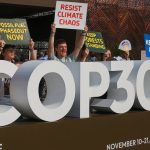Belém, Brazil, Nov 24 (Swara) – COP30 closed in the Brazilian city of Belém on Saturday after marathon overnight talks, with UN climate chief Simon Stiell declaring that “a new economy is rising, while the old polluting one is running out of road.” The summit wrapped up at sunrise on November 22, marking what many negotiators described as a pivotal moment for climate ambition and global solidarity — even as a significant gap on fossil fuels remained.
Big moves on finance and implementation
The final decision sets out some of the most ambitious financial goals ever agreed under the UN climate process. Parties committed to mobilising at least $1.3 trillion per year by 2035 for climate action, alongside a pledge to double adaptation finance by 2025 and triple it by 2035. The loss and damage fund, established at COP28, was formally operationalised with a confirmed replenishment cycle.
Two major global initiatives were launched:
- The Global Implementation Accelerator, to speed up the delivery of countries’ national climate plans, and
- The Belém Mission to 1.5°C, designed to keep the Paris temperature goal within reach.
In a first for any COP decision, governments also pledged to counter climate disinformation, committing to protect information integrity and guard against narratives that undermine science-based action.
A missing piece: fossil fuels
Despite strong expectations, the final text contained no explicit commitment to phase out fossil fuels. More than 80 countries had backed Brazil’s proposal for a formal roadmap, and earlier drafts contained clear language on phasing out coal, oil and gas. But in the final hours, negotiators reverted to the weaker reference from the UAE Consensus at COP28, which calls for “transitioning away from fossil fuels.”
For many — including South American and EU negotiators, vulnerable nations and civil society groups — the omission overshadowed other gains.
Before the final plenary, leading Brazilian scientist Carlos Nobre issued a stark warning: fossil fuel use must fall to zero by 2040–2045 to avoid temperature rises of up to 2.5°C by mid-century. Failure to act, he said, risks the near-total loss of coral reefs, the collapse of the Amazon rainforest and rapid melting of the Greenland ice sheet.
What the deal delivers
After two weeks of tense, often chaotic negotiations, the adopted Mutirão text brings four of the most contentious issues — mitigation, finance, adaptation and trade barriers — into a single, consensus-based outcome. Seventeen other decisions were also approved.
The text declares the shift toward low-emissions and climate-resilient development “irreversible”, noting that investments in renewable energy now outpace those in fossil fuels two to one. It frames climate action as an economic opportunity, highlighting benefits for growth, jobs, health and energy security.
Brazil charts two new paths
At the closing session, COP30 President André Corrêa do Lago acknowledged the disappointment over fossil fuels.
“We know some of you had greater ambitions,” he said, pledging to respond to civil society’s calls for stronger action. He announced two upcoming roadmaps:
- one to end and reverse deforestation, and
- another to guide a just, orderly and equitable transition away from fossil fuels.
Both will focus heavily on mobilising resources to support countries through the transition.
A difficult road to consensus
The Belém summit saw its share of turmoil. Indigenous groups staged protests demanding stronger protection for the Amazon, and on November 20, a fire at the venue halted negotiations during a critical phase. Delegates worked through Friday night to bridge divisions on finance and ambition.
Brazil’s presidency ultimately steered parties toward an outcome anchored in implementation and support for commitments already on the table.
“Multilateralism is alive”
At the G20 Summit in Johannesburg, UN Secretary-General António Guterres hailed the agreement as evidence that nations can still unite to address global challenges.
He welcomed the Global Implementation Accelerator and reaffirmation of the UAE Consensus, but warned that COP30 “has not delivered everything that is needed.” Overshooting 1.5°C, he said, remains a real and dangerous possibility without rapid emissions cuts and massive climate finance. “COP30 is over, but the work is not.”
Holding the line at 1.5°C
UN climate chief Simon Stiell highlighted key gains — increased adaptation finance, new implementation tools and commitments to a just energy transition — despite what he called “turbulent geopolitical waters.”
By adopting the Mutirão package, he said, 194 nations kept humanity “in the fight for a livable planet,” determined to hold the line at 1.5°C.
Beyond negotiations: A wave of voluntary commitments
Brazil also spotlighted new pledges made under the COP30 Action Agenda, including:
- Tropical Forests Forever Fund: $5.5 billion raised; 53 countries now participating, with at least 20% of funds for Indigenous Peoples and local communities.
- Belém Health Action Plan: the first global initiative on climate-related health threats, backed by $300 million from 35 philanthropic groups.
- UNEZA Alliance: public utilities pledging $66 billion annually for renewable energy and $82 billion for transmission and storage.
- Cities, regions and companies: a coalition representing 25,000 buildings reported cutting more than 850,000 tonnes of CO₂ in 2024.
Climate justice on the agenda
Countries also agreed to develop a mechanism to support just transitions, with strengthened cooperation, capacity-building and technical assistance.
Source: UN News
























